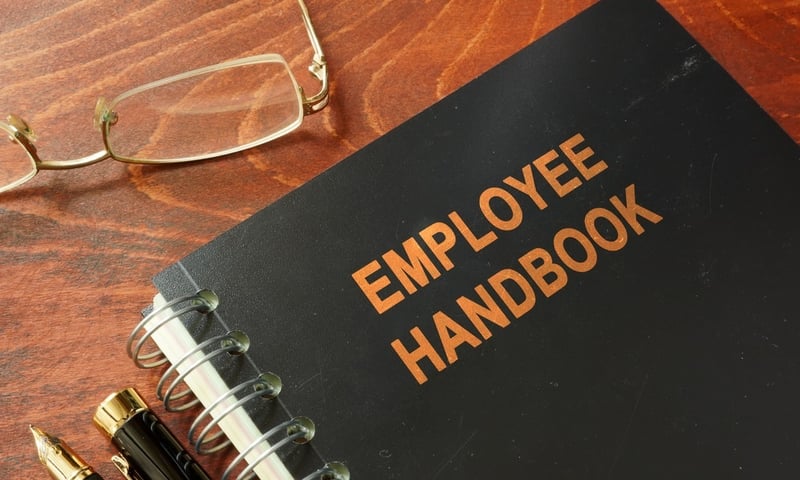Ideally, every business and organization should have an updated employee handbook, or policy manual. Unfortunately, this is not always the case for many businesses.

“It is my experience working with smaller businesses that they do not have a designated HR person on board and, unfortunately, do not have sufficient time to write a handbook or review HR laws. A handbook is the first line of defense in avoiding costly labor law suits.”
- Ginny Kuhel | Accuchex Payroll & Insurance Services
The Importance of an Employee Handbook
Simply put, a company policy is "a statement that defines a business's approach to an issue." Your employee handbook, or policy manual, should be a comprehensive explanation of your company's rules for your employee's conduct. In addition, it will advise your employees of the appropriate behavior in your workplace.
A well-written policy manual will also document your company's actions on behalf of your employees, such as their vacation and sick time benefits. Having an up-to-date employee handbook in place will also help with compliance and provide evidence of such in those instances where employee claims may arise.
But the problem is that too many companies either fail to produce a written set of policies, or what they do have is often incomplete and out-of-date. And with the increasing number of government rules, regulations and policy mandates, it's critical to produce and maintain a comprehensive company policy manual.
Your Employee Handbook Reflects Your Company Culture
An often overlooked, but actually important consideration, is what you will call your handbook.
While the conventional approach is to simply refer to this document as an employee, or company, manual or handbook, this is not required nor even recommended. A bit of creativity can come up with a title that makes the document more accessible and interesting.
Some suggestions are "Team Guidebook", "Company Policy Guide" and "Company Culture Manual". The idea is to come up with a title that engages your staff and reflects the prevailing culture of your organization. The more "formal" your organization, the more formal the title should be. The more informal your culture, your title can follow suit.
Another important consideration is to preface your handbook with your company mission. By including this, you establish up-front why you do what you do as a company and you provide a larger context for the content of the handbook.
Your company's mission statement, along with your stated company values, will set the stage for more meaningful policies and serve to foster a greater sense of being part of a team among your employees.
Employee Handbooks and Employee Onboarding
Another important function of your employee handbook is introducing new employees to your organization and your company culture. Your handbook should play a crucial role in your new employee onboarding process. The introduction section of your handbook can be used to set the standard for the employment relationship and provide the context for the applicable policies documented in the handbook.
A properly written handbook primarily serves to provide your employees with a clear understanding of their responsibilities. The handbook should communicate the worker’s general responsibilities for safety, timekeeping, reporting and other functions. By providing clear, accessible information, your employee handbook can ensure that your employees are guided in the right direction.
In addition, an employee handbook provides your management team with overall management objectives and best practices. This is important for fostering healthy management-employee relationships. Well-written and documented policies define logistics for payroll timekeeping, hours worked and pay periods.
And, finally, an employee handbook will clearly communicate your company’s policiesfor functions such as employment, conduct and behavior, compensation and other policies you implement.
Along with communicating these policies to your employees, your managers can refer to it when answering questions or making decisions regarding your policies. A well-written policy manual will help ensure their answers and actions are consistent with your policies and best practices.
Employee Handbooks and Labor Law Compliance
A common HR management question is whether employee policy manuals, or handbooks, are required by law. The state of California, for example, does not require businesses to have a handbook. However, in California, if a manual or handbook is created then there are policies that must be included.
According to CalChamber,
Certain policies are mandatory and must be included in your employee handbook. For example, California employers must have a written harassment, discrimination and retaliation prevention policy. Including these policies clarifies for employees their rights and obligations, and protect you from potential liability.
Although a policy manual can be good for documenting company policies, it can actually lead to potential lawsuits if it's done incorrectly. Employers must ensure that their policies do not violate any federal or state laws or override the at-will employment relationship.
A comprehensive handbook not only communicates different entitlements and obligations to your employees, but it serves to demonstrate that your organization strives to be compliant with these regulations if employee claims are at issue.
It is an unfortunate, but the fact is that most employers will likely face an employee lawsuit or similar challenge. However, when this does happen, a copy of your handbook can be one of the most useful documents you can provide your attorney or third party investigator.
A comprehensive and compliant employee handbook can be used to show that your company exercised “reasonable care” towards your employees.
Professional Help for Your HR Management
A comprehensive and updated policy manual can help your organization articulate its obligations, while providing guidance to the labor law and compliance. It pays to take time to understand the law and to prioritize the development of policies and procedures.
Another key step in maintaining HR compliance, while increasing your company's cost-effectiveness, is to consider outsourcing. A professional agency such as Accuchex can provide much-needed help with Human Resources needs and questions.
Accuchex is a full spectrum Payroll Management Services provider offering expertise in Time Management, Insurance and Retirement issues, as well. Sign up for our free "My HR Support Center" tour.




